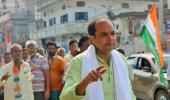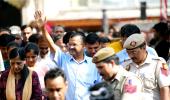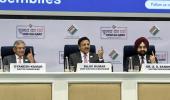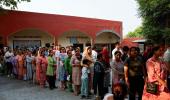'Imagine what the BJP's urges would be if India's electorate awarded it truly brute majorities like the 400 plus seats the prime minister called for in the 2024 general elections?' asks Shyam G Menon.

The emergent imagination of the political Right-Wing in India is as much commercial in texture as whatever else has been ascribed to it.
Culture and religion are pushed but they appear vehicles for achieving goals rooted in economic growth and splitting the commercial pie.
The slogans falling in the one nation, one attribute category betray this well. The nation is packaged as one culturally and religiously but the targeted attribute leverages the former for scale and economies of scale.
It is all about forging a marketable vehicle, one with the largest sprawl and sureness of delivery for political messaging and managing political environments.
Acting so, the BJP centralises our collective destiny in Delhi.
It also becomes the most resource rich top dog in that space, particularly if one goes by the allegations of quid pro quo raised during the electoral bonds controversy.
Rendering this imagery even more concerning has been the specter of polarised wealth, which the political Right-Wing not only appears to be comfortable with but seemingly advocates as it pursues its trickle-down model of economic well-being.
Viewed so, the earlier mentioned scale and economies of scale shaped using cultural and religious excuses, would seem a pie gifted for exploitation by the big fish in the mercantile sea.
The overall feel is not only mercantile but partial to big money.
The Bharatiya Janata Party has been very careful in its response to critics on the matter.
For the sake of plurality and inclusiveness (a make-believe inclusiveness), the BJP supports democracy (mercifully, people now see it as a doctored democracy in service of authoritarianism).
But it has been silent on the accusations its faces of wishing for one party-domination and a considerably weakened Opposition.
It is guilty of subverting and smashing the Opposition through witch-hunts.
A democracy without an Opposition is hardly a democracy.
No wonder, the aspiration of the Narendra Modi government resembles an Indian version of China.
This ambition is even as the BJP, in past elections, got only the largest vote share and not an over 50 per cent majority of all votes cast.
Imagine what the BJP's urges would be if India's electorate awarded it truly brute majorities like the 400 plus seats the prime minister called for in the 2024 general elections?
As clear as the intentions of India's political Right-Wing, are the prospective solutions to check such majoritarian and authoritative scenarios.
One solution is the predicament the country is currently in -- the 2024 elections to Parliament.
There are those (the 'There is no other alternative' lot) who feel that a BJP government returned to power with reduced majority may be less arrogant and less power hungry in its ways.
I believe they are wrong.
One cannot expect muted arrogance and reduced appetite for mischief from a political party reputed to be several thousand crores rich especially after the electoral bond scam.
As long as they sit on that pile of money and also receive the backing of cadres of the Rashtriya Swayamsevak Sangh and other Right-Wing outfits, the BJP will keep pursuing its agenda playing a whole country (read market) into the hands of a privileged elite.
In return, the privileged will reward the party by swelling its coffers.
The establishment of this model like a cynical millstone around India's neck is the real legacy of the BJP's decade-old rule.
Its embellishments include associate economic and social misadventures (demonetiSation, Muslims as enemy etc), indulged to fashion the party as ideal choice for capital seeking an effective single window access to the Indian market.
Silos by polarised outlook are known to execute loyally as they chase their misplaced illusions with astute focus.
The world has seen the results of such brainwashing before.
If the above is not to happen, then the outcome of the 2024 general elections has to be more than just a return of the BJP with sizable majority or reduced majority. The party must be defeated.
Ideally by a sizable margin so that the cure for the ills it caused may also be possible.
For now, that appears a dream; as much an illusion as the Right-Wing's agenda.
Right now, the election is hard to gauge because free opinion is still muzzled and to that extent, feedback is contaminated by the compulsion of people to be politically correct or be on the winning side.
Not to mention -- that BJP and Modi style of psyching oneself to win through incredibly positive statements even in scenarios least supportive of such bombastic optimism.
The polls to Parliament may therefore play out this way or that.
We have no option but to wait till the counting is done for an outline of what could be in store.

The second solution spoken of to check centralised, authoritarian scenarios has been the assembly elections.
The logic here is that pulls of a non-BJP sort empowers the federal aspect of our nationhood and lets individual states checkmate in their territory, the contentious policies promoted by India's Right-Wing.
While this sounds attractive as a Great Wall to the BJP's relentless onslaught, a less appreciated problem is the lack of specific emphasis on federalism in the Constitution.
Scholars have cited a partiality to the unitary state of existence in the Constitution.
India's has often been called a quasi-federal system.
A problem here is that the disproportionate emphasis on the unitary State helps the BJP legitimise its excesses perpetrated from the Centre.
For want of an explicit embrace of federalism in the Constitution, the BJP's denizens succeed in securing an oblique approval for their actions designed to centralise ever more.
In times like today, when clear signs have emerged of the power vested in our unitary togetherness being harvested for purposes of sustained authoritarianism, one wonders if a mere mention of federalism in the Constitution suffices for ample protection of our freedom and personal liberties.
Shouldn't the enshrinement of India's federal structure be as strongly done as its commitment to a unitary existence? Thanks to today's India being suffocated by authoritarian policies and the BJP's agenda being distinctly partial to the unitary aspect, debates on federalism and the voicing of opinions therein, have become a tight rope walk.
It is therefore almost a precondition to the strengthening of India's federalism that the BJP government must go.
Only then, will the subject get properly and freely discussed.
Only then will there be adequate safeguards to the excesses committed by parties like the BJP and its ilk.
While there have been electorate-friendly statements by the BJP hailing democracy and the Constitution in times close to elections, party members and other Right-Wing fanatics have in the past been vocal in their demand to amend the Constitution and take the country nearer to what they have in mind for India.
To my memory, the non-BJP side -- which we may loosely call the liberal section -- hasn't made any similar calls suiting their agenda.
Indeed, some argue, liberals don't have an agenda. They hold it as a fault.
That is debatable, for to be liberal is to shun polarising attributes and embrace inclusiveness, including the sort in which, India's Right-Wing is free to parade its eccentricities and extreme tendencies and see them watered down naturally through greater engagement with the public.
However, if this is to happen on an even footing without the push for unitary existence triggering terrible consequences like backsliding Indian democracy, then the mention of federalism in the Constitution should be ideally strengthened and the same should not be left to mere interpretation and precedent.
There must be federalism as a recommended resting point, which the political pendulum can swing back to.
If liberals call for any amendment, then it should be this -- one that makes sure federalism is as strongly valued in the Constitution, as remaining unitary is.
Shyam G Menon is a freelance journalist based in Mumbai.
Feature Presentation: Aslam Hunani/Rediff.com











 © 2025
© 2025